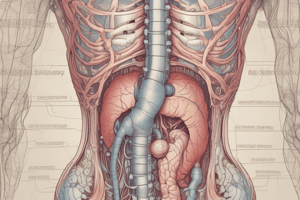Podcast
Questions and Answers
Which one of these is a function of the salivary glands in the mouth?
Which one of these is a function of the salivary glands in the mouth?
- To mechanically break up food
- To blend fluids with food and liquids to ease swallowing (correct)
- To break down food into simpler molecules
- To absorb nutrients from food
Which part of the digestive system controls the movement of food from the esophagus into the stomach?
Which part of the digestive system controls the movement of food from the esophagus into the stomach?
- Ileocecal valve
- Lower esophageal sphincter (correct)
- Upper esophageal sphincter
- Pyloric sphincter
Which organ is responsible for the withdrawal of water from the digestive tract?
Which organ is responsible for the withdrawal of water from the digestive tract?
- Large intestine (colon) (correct)
- Stomach
- Small intestine
- Rectum
What is the name of the semi-liquid mass formed in the stomach after the digestion process begins?
What is the name of the semi-liquid mass formed in the stomach after the digestion process begins?
Which sphincter muscle opens into the small intestine from the stomach?
Which sphincter muscle opens into the small intestine from the stomach?
Which of the following processes involves both circular and longitudinal muscles to push intestinal contents along?
Which of the following processes involves both circular and longitudinal muscles to push intestinal contents along?
What is the function of sodium bicarbonate in the digestive system?
What is the function of sodium bicarbonate in the digestive system?
Which organ stores bile until it is needed in the digestive process?
Which organ stores bile until it is needed in the digestive process?
What is the primary function of an emulsifier like bile in the digestive system?
What is the primary function of an emulsifier like bile in the digestive system?
Which digestive secretion protects the intestinal wall?
Which digestive secretion protects the intestinal wall?
Where does most fat breakdown occur in the digestive system?
Where does most fat breakdown occur in the digestive system?
Which organ secretes pancreatic juice in the digestive system?
Which organ secretes pancreatic juice in the digestive system?
Which part of the small intestine is responsible for the secretion of intestinal juices?
Which part of the small intestine is responsible for the secretion of intestinal juices?
What type of nutrients are prepared for transport in the bloodstream?
What type of nutrients are prepared for transport in the bloodstream?
Which cells in the small intestine regulate nutrient absorption based on the body's needs?
Which cells in the small intestine regulate nutrient absorption based on the body's needs?
What system bypasses the liver initially when transporting larger fats and fat-soluble vitamins?
What system bypasses the liver initially when transporting larger fats and fat-soluble vitamins?
Which part of the body is responsible for delivering oxygen and nutrients, as well as removing carbon dioxide and wastes?
Which part of the body is responsible for delivering oxygen and nutrients, as well as removing carbon dioxide and wastes?
Which cells in the small intestine are responsible for mucus secretion?
Which cells in the small intestine are responsible for mucus secretion?
What is the main characteristic of diarrhea?
What is the main characteristic of diarrhea?
Which of these is NOT a common cause of constipation?
Which of these is NOT a common cause of constipation?
Where does bacterial fermentation causing intestinal gas primarily occur?
Where does bacterial fermentation causing intestinal gas primarily occur?
Which condition is NOT associated with frequent diarrhea?
Which condition is NOT associated with frequent diarrhea?
Which lifestyle factor can help prevent constipation?
Which lifestyle factor can help prevent constipation?
Which of these is NOT a harmful practice for treating constipation?
Which of these is NOT a harmful practice for treating constipation?
What is a recommended strategy to prevent constipation?
What is a recommended strategy to prevent constipation?
Which activity can help reduce belching?
Which activity can help reduce belching?
What is a recommended strategy for managing intestinal gas?
What is a recommended strategy for managing intestinal gas?
What is a recommended lifestyle change for people with ulcers?
What is a recommended lifestyle change for people with ulcers?
What is a recommended medication strategy for people with ulcers?
What is a recommended medication strategy for people with ulcers?
Study Notes
Digestive Secretions and Their Major Actions
- Salivary glands produce saliva that eases swallowing and breaks down carbohydrates
- Gastric glands produce gastric juice that mixes with food, uncoils proteins, and breaks down proteins
- Pancreas produces pancreatic juice that neutralizes acidic gastric juices and breaks down carbohydrates, fats, and proteins
- Liver produces bile that emulsifies fat for enzyme breakdown, stored in the gallbladder, and released into the small intestine
- Intestinal glands produce intestinal juice that breaks down carbohydrates, fats, and proteins, and protects the intestinal wall
Digestive Process
- Mouth: chewing breaks up food, mixed with saliva that eases swallowing
- Esophagus: bolus passes through the pharynx, controlled by two sphincter muscles
- Stomach: chyme is formed, and the pyloric sphincter opens into the small intestine
- Small intestine: pancreatic juice and bile mix with chyme, and enzymes break down nutrients
- Large intestine (colon): water is withdrawn, and the ileocecal valve controls movement
Intestinal Cells and Absorption
- Villi: regulate nutrient absorption, with microvilli that recognize and act on different nutrients
- Microvilli: enzymes and "pumps" that recognize and act on different nutrients
- Crypts: secrete intestinal juices
- Goblet cells: secrete mucus
Nutrient Transport
- Bloodstream: absorbs water-soluble nutrients and smaller fat digestion products
- Lymphatic system: absorbs larger fats and fat-soluble vitamins, forming chylomicrons that bypass the liver initially
Liver and Circulatory Systems
- Liver: receives nutrients from the digestive tract, regulates nutrient absorption
- Circulatory system: heart pumps blood, delivers oxygen and nutrients, and removes waste products
- Blood flow: specially routed for the digestive system
Digestive Disorders and Conditions
- Diarrhea: frequent watery stools, often due to IBS, colitis, and celiac disease
- Constipation: often due to lifestyle, medications, and preventable by diet and lifestyle choices
- Gastroesophageal reflux: stomach acid flows back into the esophagus, commonly known as heartburn
- Hemorrhoids, diverticulosis, and laxatives: harmful practices and colonic irrigation
- Gas: mainly caused by bacterial fermentation of sugars, fiber, and starch in the large intestine
Studying That Suits You
Use AI to generate personalized quizzes and flashcards to suit your learning preferences.
Description
Test your knowledge on the process of digestion starting from the mouth, including chewing, taste sensations, saliva, and the passage through the pharynx. Learn about the movement of food from the mouth to the esophagus and stomach, including the roles of sphincter muscles, bolus, and chyme.




